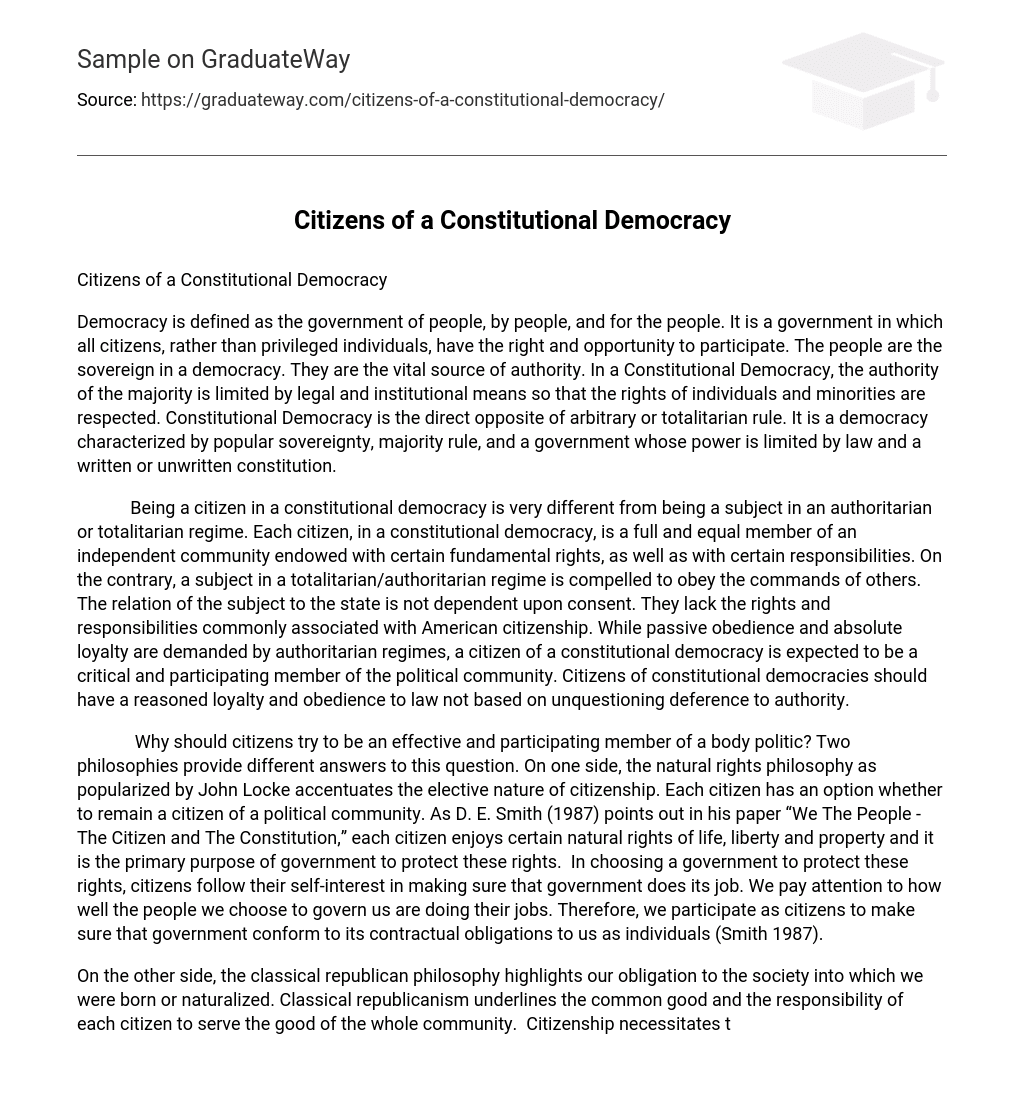Democracy is defined as the government of people, by people, and for the people. It is a government in which all citizens, rather than privileged individuals, have the right and opportunity to participate. The people are the sovereign in a democracy. They are the vital source of authority. In a Constitutional Democracy, the authority of the majority is limited by legal and institutional means so that the rights of individuals and minorities are respected. Constitutional Democracy is the direct opposite of arbitrary or totalitarian rule. It is a democracy characterized by popular sovereignty, majority rule, and a government whose power is limited by law and a written or unwritten constitution.
Being a citizen in a constitutional democracy is very different from being a subject in an authoritarian or totalitarian regime. Each citizen, in a constitutional democracy, is a full and equal member of an independent community endowed with certain fundamental rights, as well as with certain responsibilities. On the contrary, a subject in a totalitarian/authoritarian regime is compelled to obey the commands of others. The relation of the subject to the state is not dependent upon consent. They lack the rights and responsibilities commonly associated with American citizenship. While passive obedience and absolute loyalty are demanded by authoritarian regimes, a citizen of a constitutional democracy is expected to be a critical and participating member of the political community. Citizens of constitutional democracies should have a reasoned loyalty and obedience to law not based on unquestioning deference to authority.
Why should citizens try to be an effective and participating member of a body politic? Two philosophies provide different answers to this question. On one side, the natural rights philosophy as popularized by John Locke accentuates the elective nature of citizenship. Each citizen has an option whether to remain a citizen of a political community. As D. E. Smith (1987) points out in his paper “We The People – The Citizen and The Constitution,” each citizen enjoys certain natural rights of life, liberty and property and it is the primary purpose of government to protect these rights. In choosing a government to protect these rights, citizens follow their self-interest in making sure that government does its job. We pay attention to how well the people we choose to govern us are doing their jobs. Therefore, we participate as citizens to make sure that government conform to its contractual obligations to us as individuals (Smith 1987).
On the other side, the classical republican philosophy highlights our obligation to the society into which we were born or naturalized. Classical republicanism underlines the common good and the responsibility of each citizen to serve the good of the whole community. Citizenship necessitates that we put this general good before our own self-interest.
In principles, the ideals of constitutional democracy are completely fulfilled when every member of the body politic actively shares in government. Citizens need to identify the growing significance of the political, economic, environmental, and social context of the world beyond their borders for the preservation of constitutional democracy. Knowing how to develop and practice civic skills is essential to fulfill the promise of constitutional democracy. Hence, it is the foremost and principal reason for civic education in a constitutional democracy. The well-being of the body politic requires the widest possible civic participation of its citizens – not just any kind of participation by any kind of individuals but participation of the informed and responsible citizens and – in harmony with the common good and the safeguard of individual rights in order for a constitutional democracy to flourish.
If the polity would survive and thrive, citizens must have knowledge of its principles and institutions, skills in applying this knowledge to civic life, and dispositions that incline them to protect individual rights and promote the common good. Therefore, it is essential for the citizens of a political community to develop intellectual and participatory skills, which will enable them to think and act in behalf of their individual rights and their common good. Intellectual skills empower citizens to identify, describe, and explain information and ideas pertinent to public issues and to make and defend decisions on these issues. Participatory skills empower citizens to influence public policy decisions and to hold accountable their representatives in government.
Reference:
Smith, D. E. (Ed.). (1987). We The People – The Citizen and The Constitution (5th ed.). Washington, DC: U.S. Department of Education by act of Congress, Commission on the Bicentennial of the United States Constitution.





